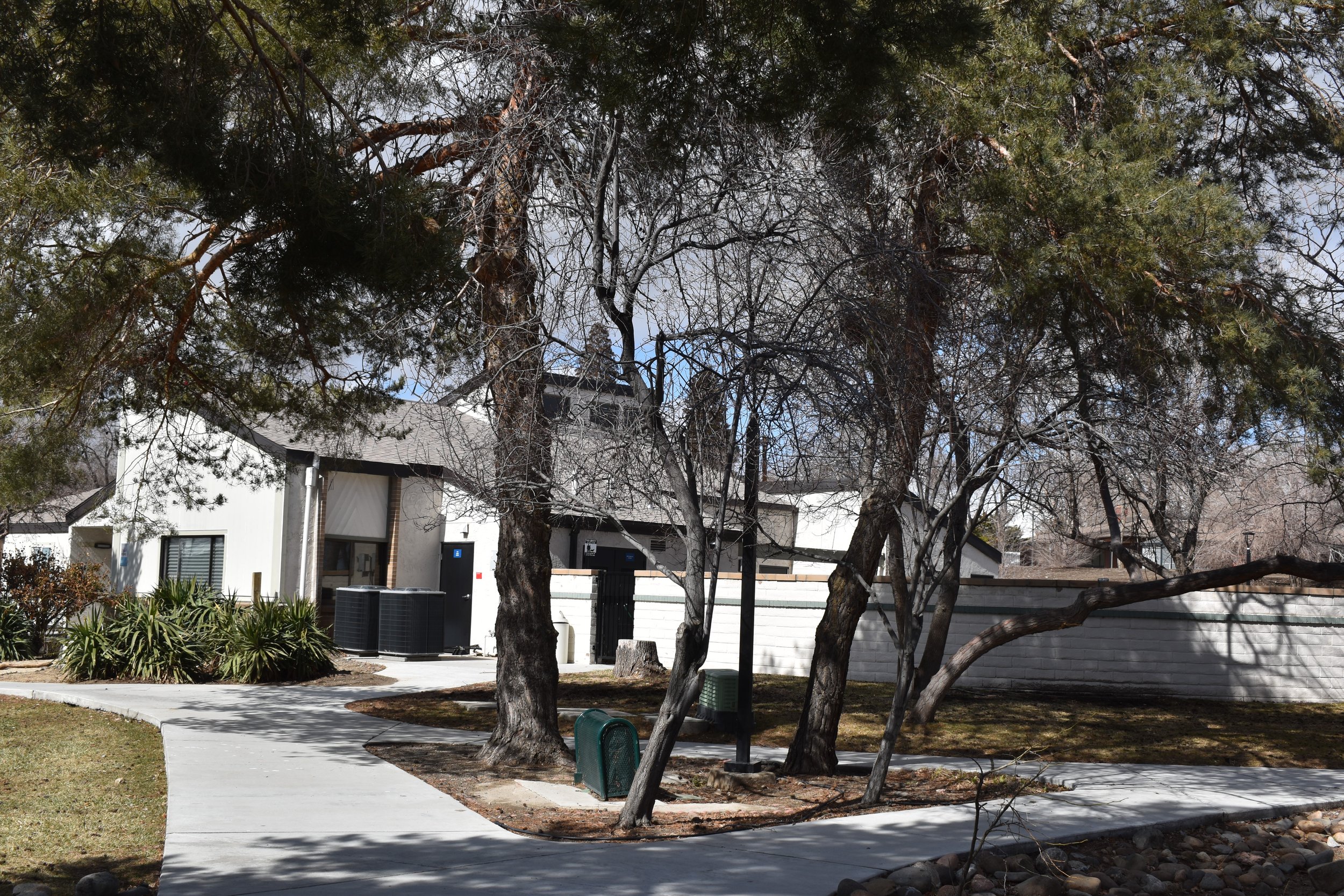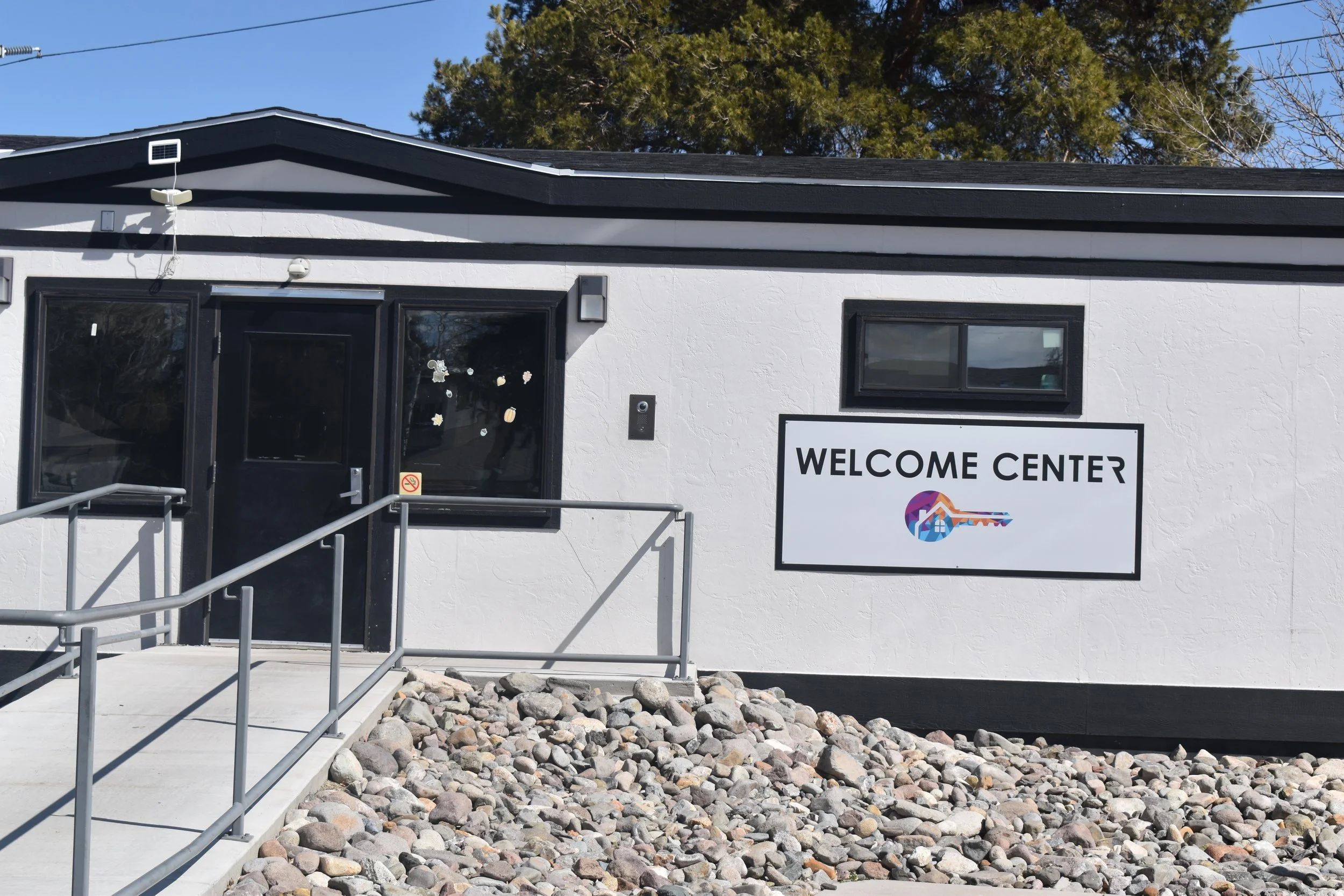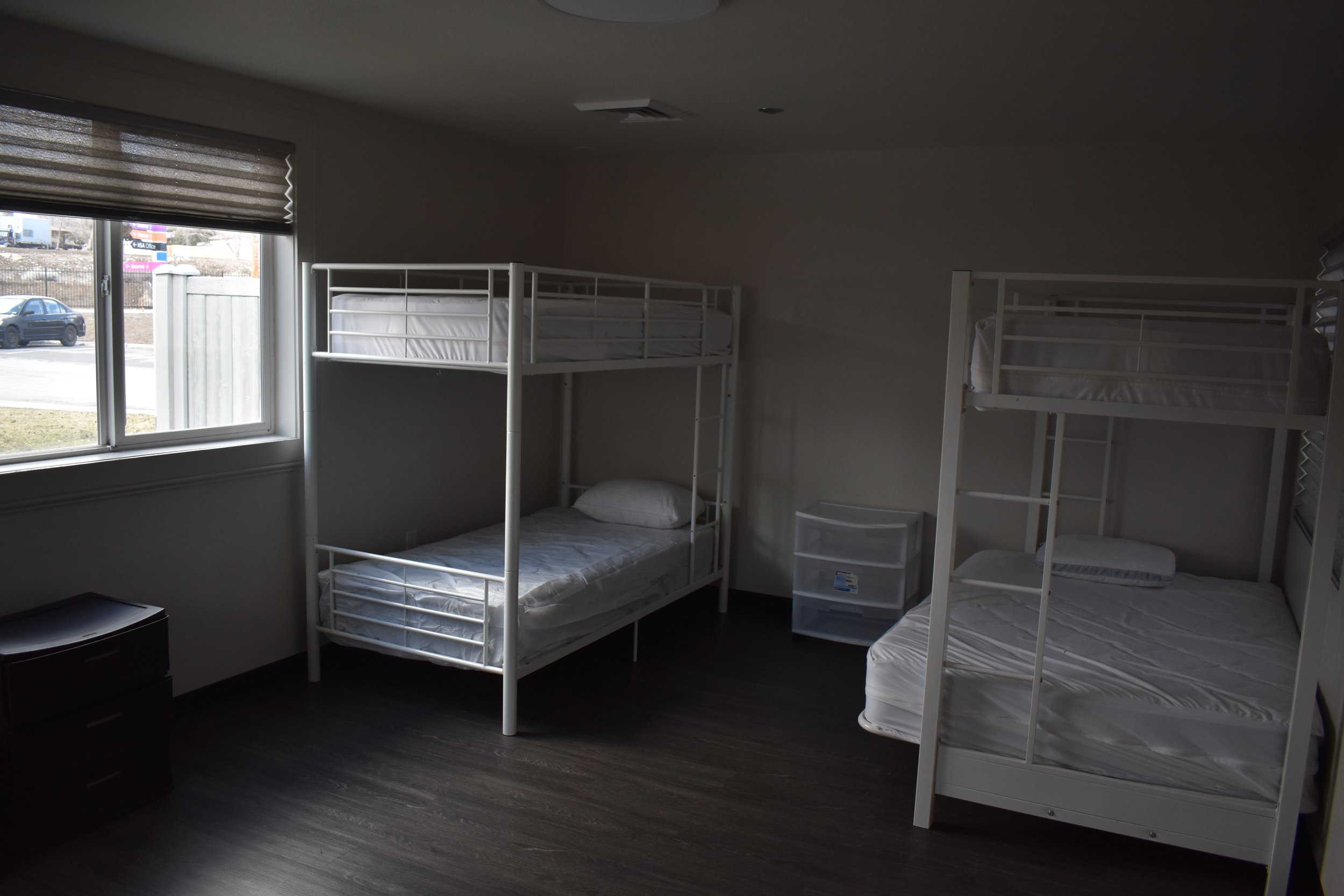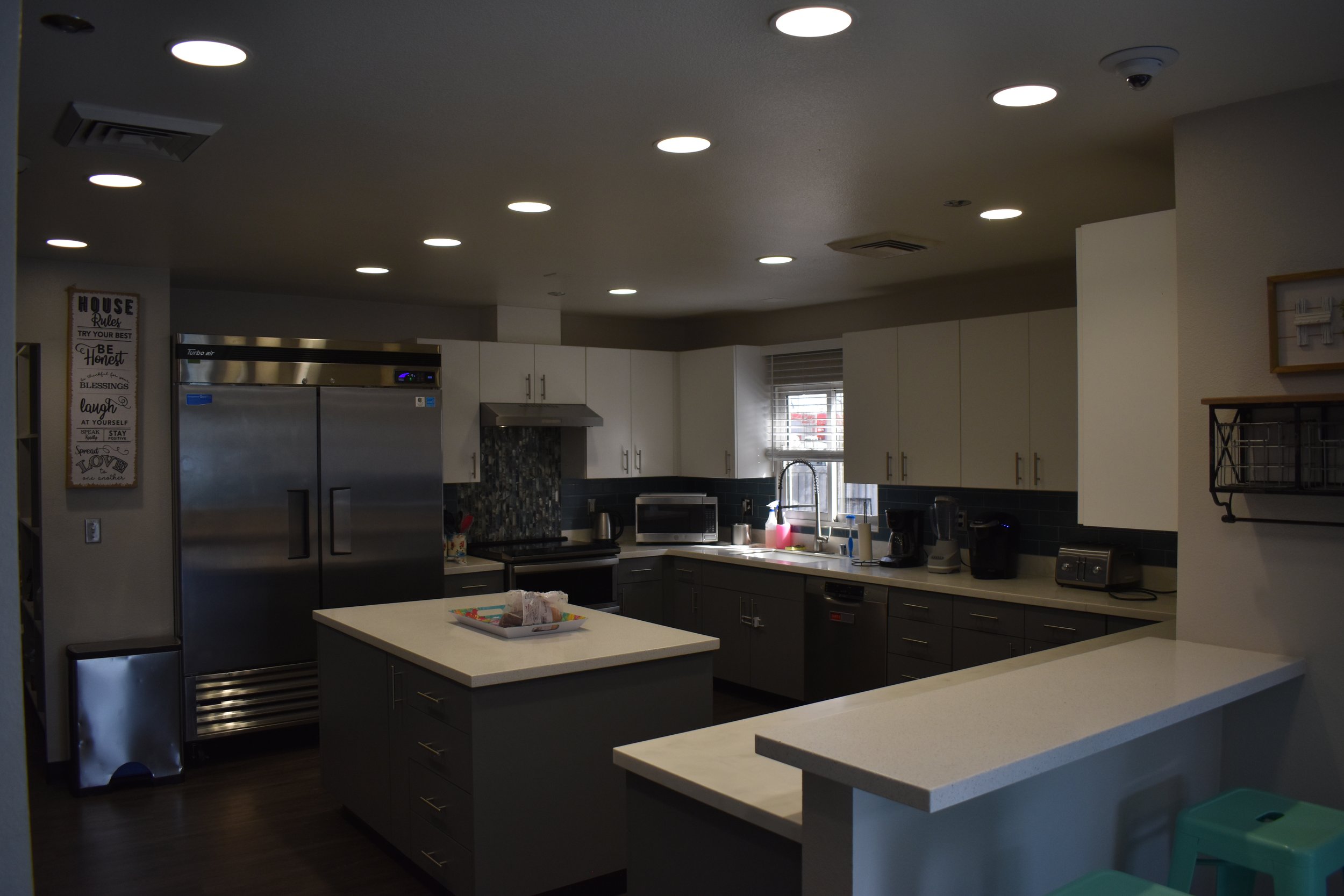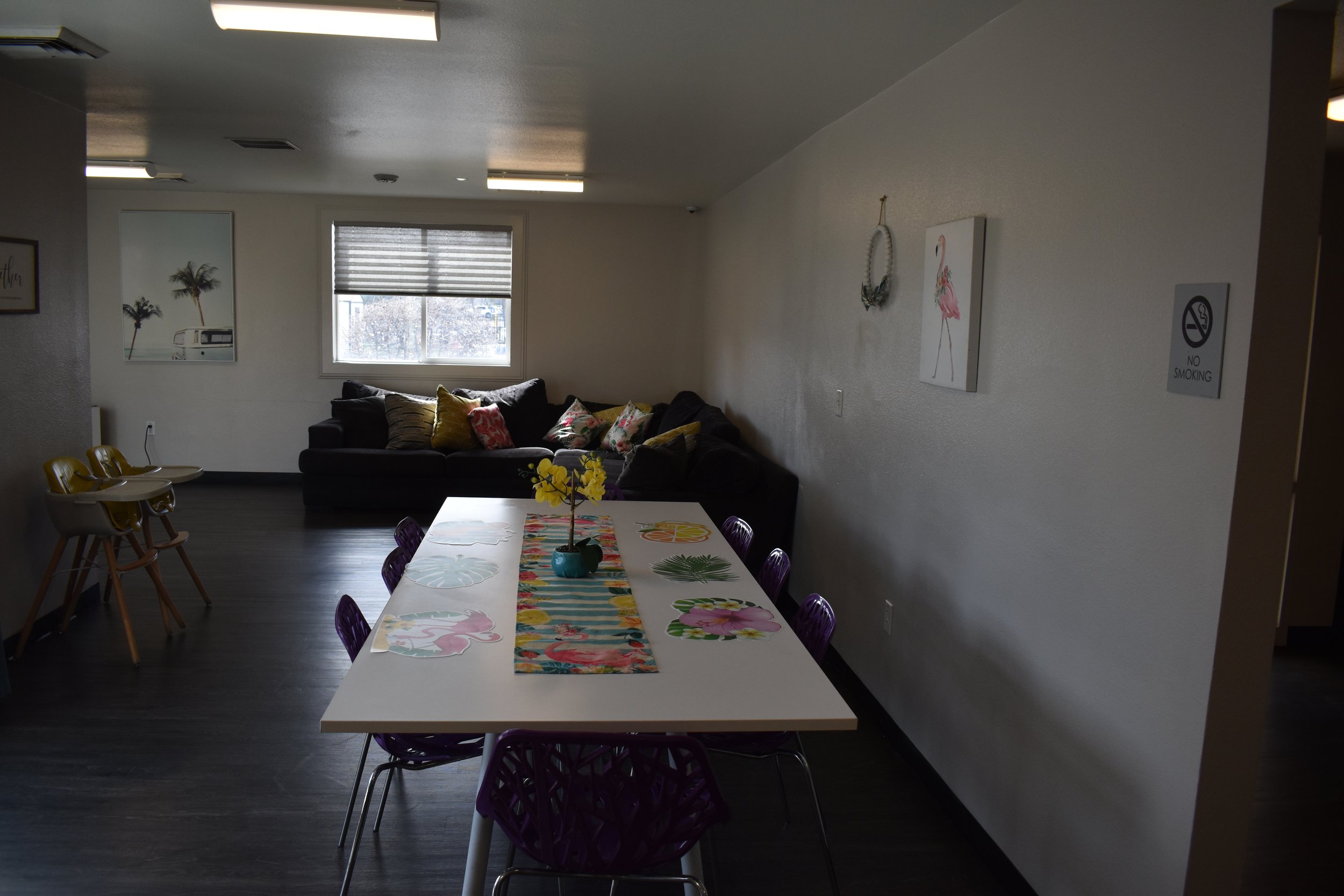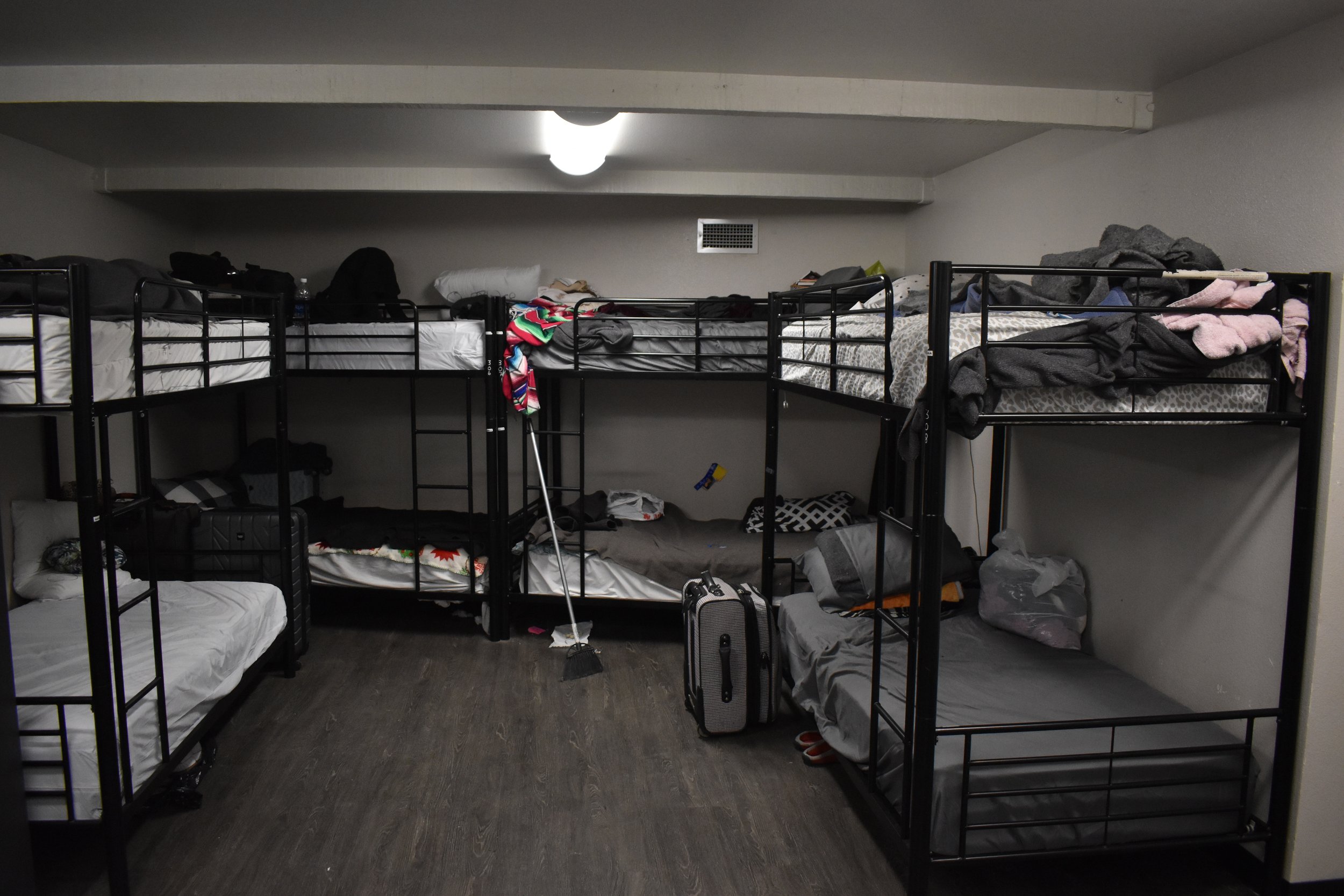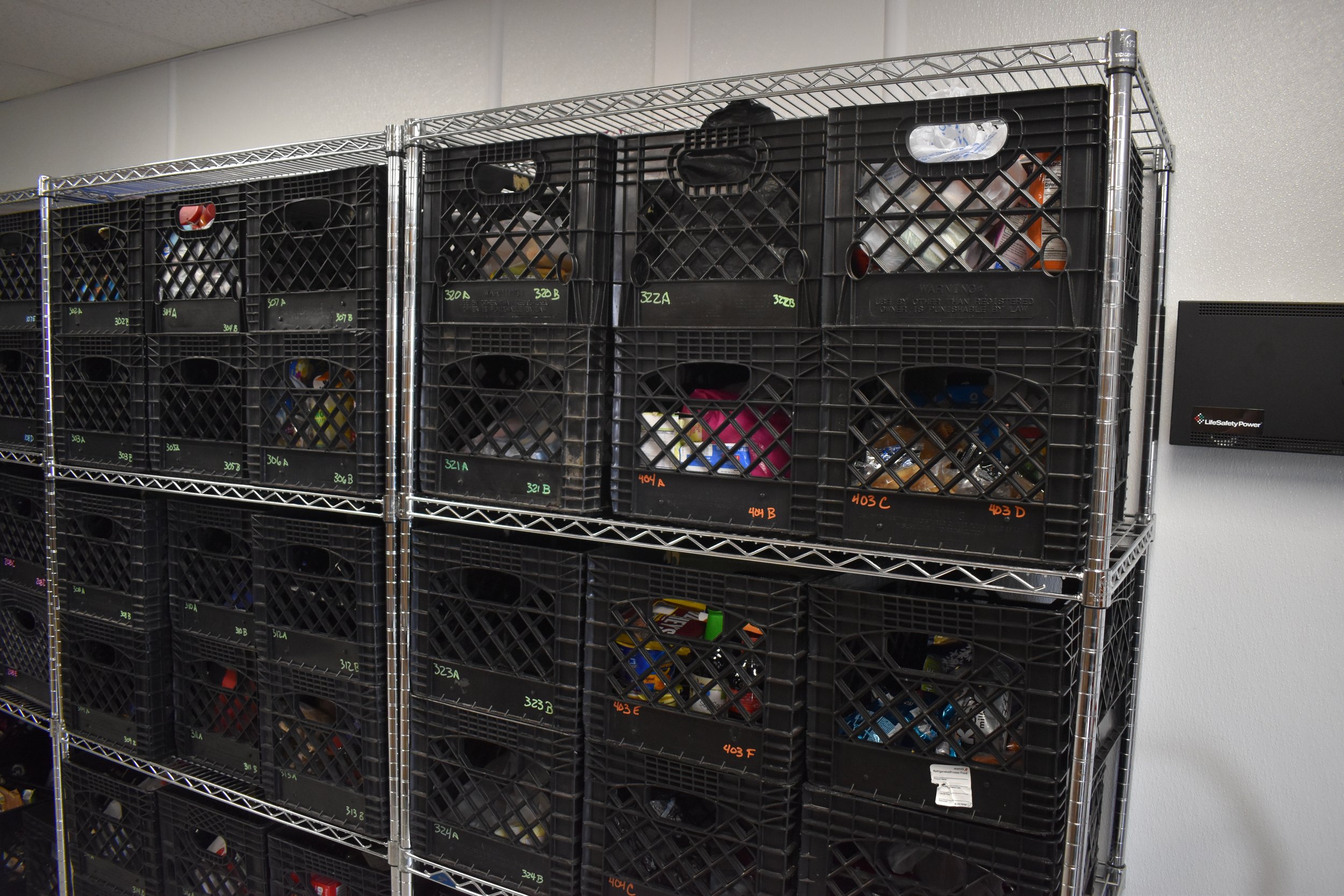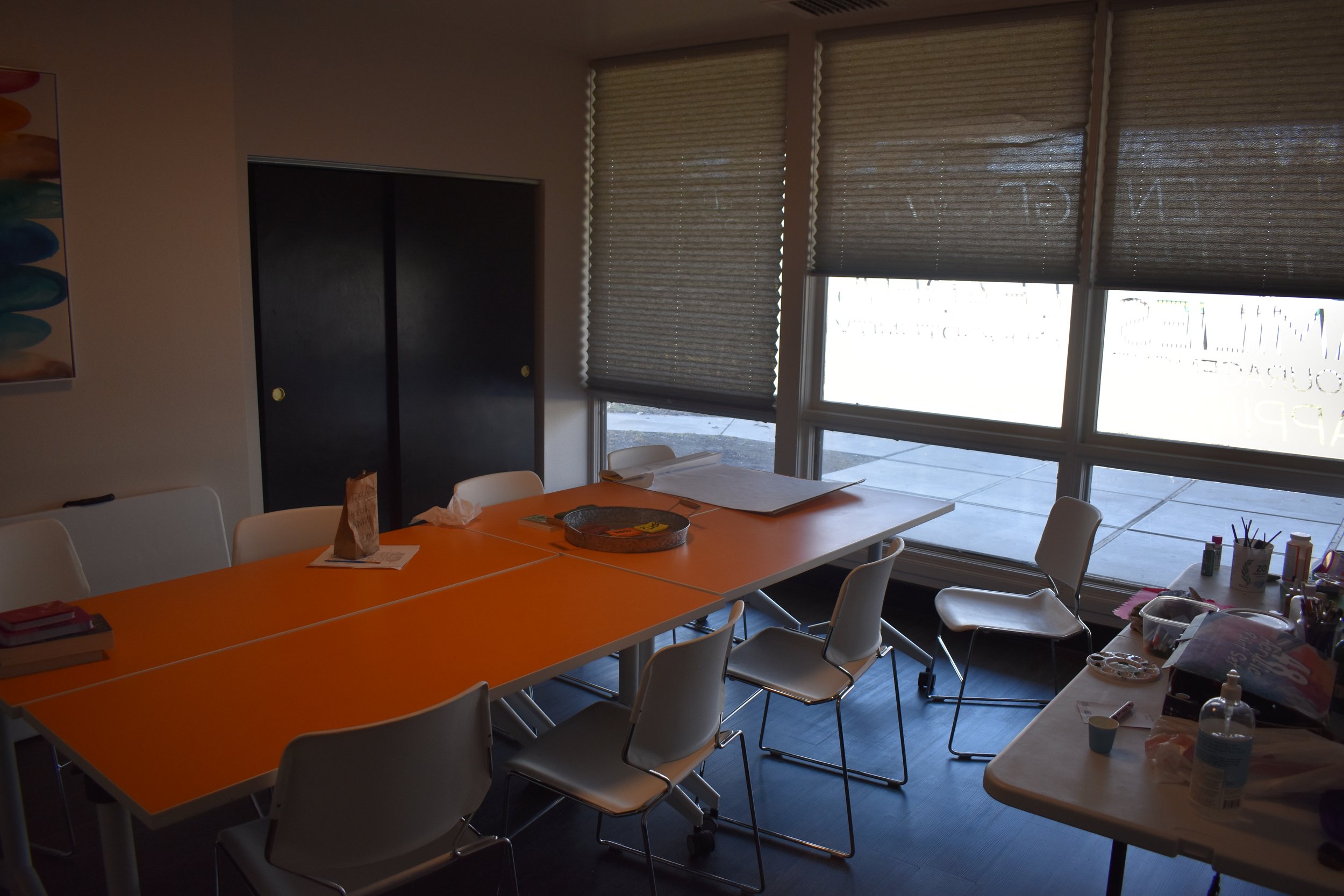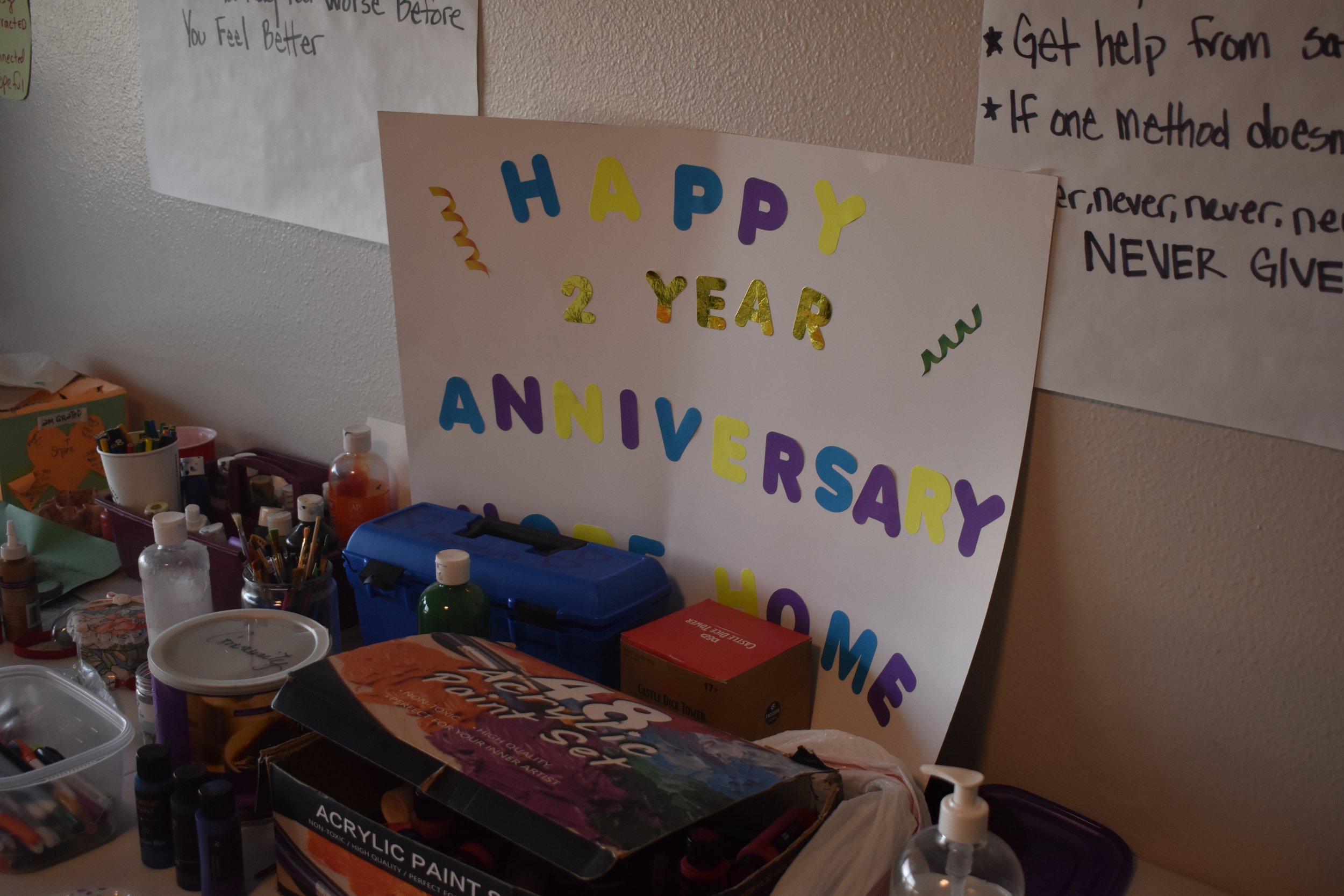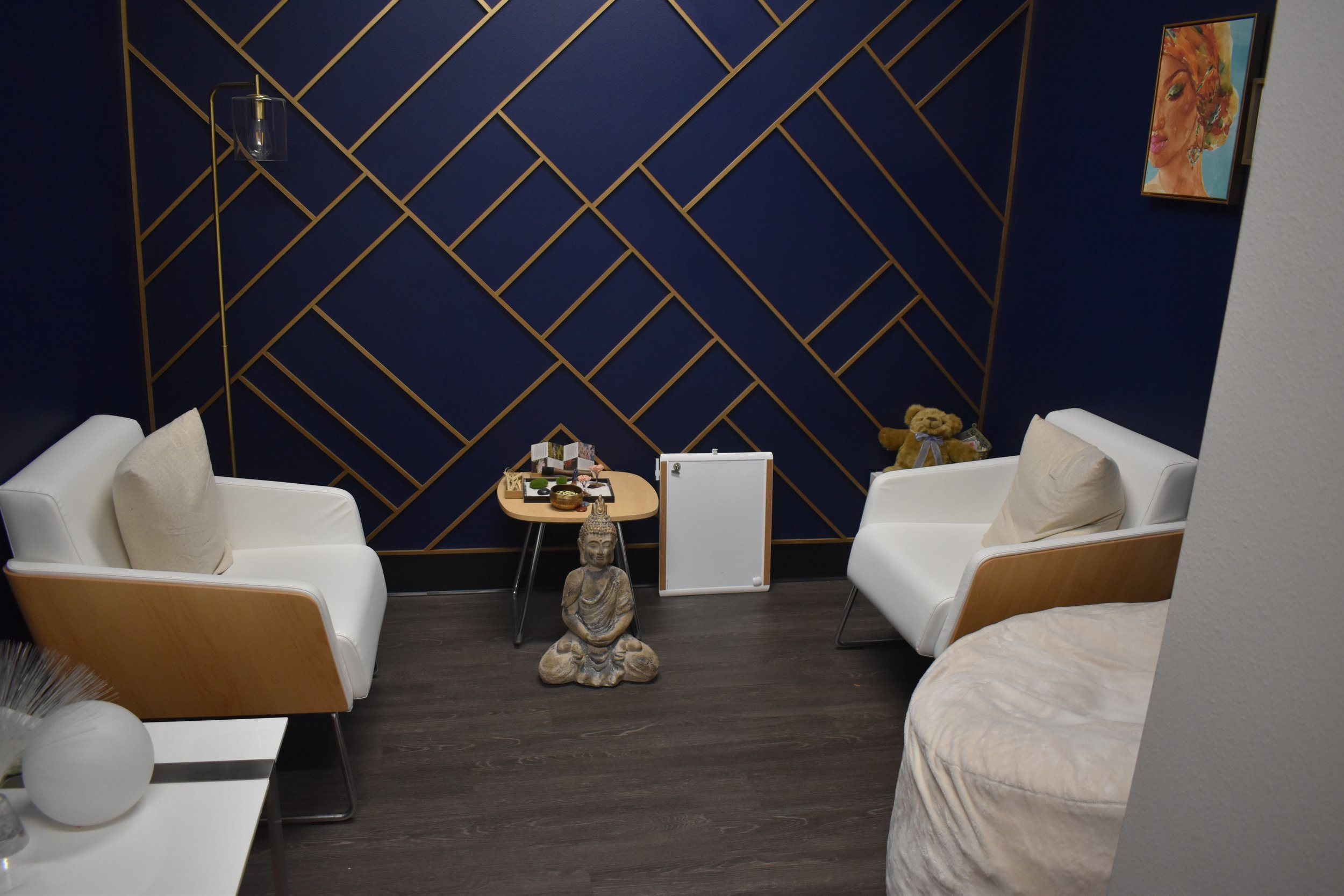Our Place operates on its Galleti Way campus in Sparks by utilizing what’s called a “person-first” approach to provide a safe and homely environment where those in need feel welcomed and wanted.
Staff, some of them with lived experience, understand that moving indoors after living on the streets can be an isolating and intimidating experience.
In the first 12 months of OUR Place being in operation, 86 families were provided with services and support, and 626 women were served. Out of those families, 58 moved into permanent housing while 133 of the women moved into confirmed permanent housing.
At the helm of OUR Place is RISE – The Reno Initiative for Shelter & Equality. RISE is a 501(c)(3) nonprofit organization founded in 2012 to support unsheltered people in the Reno-Sparks area through mutual aid.
Alongside RISE, the Washoe County Human Services Agency worked to renovate existing buildings at the Northern Nevada Mental Health campus on Galletti Way in Sparks to create OUR Place. The entire project – which involved remodeling 11 buildings and major landscaping – cost $16 million. The initial renovation was highly successful, and although there are still various projects and areas that are constantly being updated and added, OUR Place is a clean, well-managed, and modern campus, bustling with people being helped and providers who genuinely enjoy the environment they are living or working in.
Kimberly Schweickert (left) is the current Coordinator for OUR Place and the Washoe Human Services Agency. Willis (right) is the Women’s Shelter Manager and a Crossroads graduate. They kindly offered to guide me through a tour of OUR Place.
The first building a guest would come across when seeking shelter or services is the Welcome Center. This is where guests are greeted by a member of staff who will begin the intake process for them.
On the day I was given a tour, Ariel sat behind the desk at the Welcome Center, answering the door to Walmart delivery drivers and picking up the phone which consistently rang with questions and queries.
Ariel is normally stationed in the women’s facility or JOY Home – OUR Place’s dedicated house for senior guests – but happened to be covering front desk duties that day.
“My favorite thing about working here has to be the success stories. I love seeing the women come here and then move onto bigger and better things, find housing and jobs,” Ariel tells me.
“I spent a really long time working at a hostel down on 4th street, watching the population there and wishing I could do more,” she added. “Seeing the women here do better and be proud of themselves is a huge deal, it motivates me to do better in my own life as well.”
When an individual or family enters the welcome center seeking help, staff will assess their needs, provide them with immediate food or clothing if necessary, and start the process necessary for them to have a warm and safe place to stay for the night. “It’s rare that we have to turn someone away that comes to us,” Kim Schweickert, the current coordinator for Our Place and the Washoe County Human Services Agency.explains. “It’s unfortunate, but depending on our capacity and the waitlist, we might have to refer them to the Human Services Agency. But that’s our last resort and we rarely have to do that.”
At the welcome center there’s also a welfare officer who assists guests with food stamps and other benefits, as well as the security HQ and surveillance room.
Security guards and an operations director hover over a group of television screens, going over footage from the prior day.
“We have two full-time security guards, 24 hours a day, patrolling the campus,” Schweickert points out. “We also have 150 cameras on the campus that can look inside and outside of buildings and a fingerprint system. Everyone is fingerprinted so if we haven’t seen someone in a couple of days, we can see if they’ve actually been accessing the campus, and we can deactivate prints if someone is asked to leave the campus or gets 86ed.”
Being ‘86ed’ at OUR Place happens if a guest misses all three of the curfews, and as a result, will be discharged from campus for two days. If they return with adequate reasoning and evidence for their absence, the discharge will be reversed. “The issue is we have several guests who don’t stay for long, and come in and out of the shelter,” Schweickert explains. “We don’t want to have to turn away someone fleeing domestic violence and tell them we don’t have any beds when we might but don’t know it if someone just leaves unreported.” The fingerprint system also acts as an important safety net for many female guests, particularly if they are fleeing domestic violence or a similar situation and their safety may be compromised.
Above, the family areas and women’s dorm.
After a guest goes through the intake process to determine their individual needs, they are assigned a place to stay on campus. The JOY Home (Just Older Youth) is a dedicated home for senior ladies living at OUR Place.
Stephanie – a representative from RISE – smiles at the front desk of that building, greeting guests as they enter and exit. “It’s not just sitting at the desk. They engage with the guests, they get to know them, they help them with any daily tasks they have,” Schweickert clarifies.
JOY Home existed before OUR Place opened in 2021 and RISE took over operations. “We realized that about 40% of the women we were serving in the main home were over 55 years old, and it made sense to have these ladies grouped together in specialized places,” Schweickert explains. “We want each environment to be the best fit for our individual ladies.”
The house is separated in two, with one portion housing twelve ladies and the other, eight. There is a large living room that is shared between the whole house and serves as the home’s main community hang-out area, with the guests frequently congregating there for bingo and game nights.
Each half of the house also has its own fully-stocked kitchen and dining area, with plenty of cupboard and counter space.
A lovely lady named Pamela was drinking a cup of tea and reading her book in the dining room. I was hesitant about disrupting her peace and quiet, but she was very happy to speak with me. Pamela had only been in the JOY Home for one week when I met her, previously living in various wings of the women’s home.
“It’s really been about adapting. Adapting to new roommates, sharing space,” Pamela explains. “This home is less cramped and much quieter than the orange dorm. The facilities are nicer too, I can finally cook,” she said.
Cooking facilities aren’t available in the women’s home due to the sheer volume of people living there and are only available at the JOY Home, HOPE Home, and family suites.
A kitchen area at OUR Place.
Schweickert then took me over to one of three buildings designated for families, a bright and airy space with lots of light flooding in through the windows. I was greeted by several smiling faces; Natalie – Assistant Home Manager, Ginny – House Manager, and Tyson – Guest Service Advocate.
The three family homes are very similar in floor plan and design and consist of several large family-sized bedrooms. This home was slightly bigger since it was housing 11 families at that current time. Each bedroom has a variety of bunk beds depending on how many members of the family will be staying and a closet space with hangers. Large bathrooms are dotted throughout the halls, with each bathroom serving two neighboring families. There’s a tub shower, regular shower, toilet, and a large counter and sink space. Families are provided with bedsheets, pillowcases, blankets, towels, and toiletries when they arrive at OUR Place, so their bedrooms don’t feel too empty for very long.
“Grace Church gives us funding every year which we use so guests can pick out new bedding, towels, sheets, pajamas – everything for our welcome kits,” Schweickert explains. “When a family moves, RISE will come in and clean everything and then our maintenance guy Darren will come in and repaint walls, fix any holes, and gets the room ready for the next family, so it feels brand new to them.”
Food storage for guests, an art room and a therapy room at Our Place.
We moved on from the empty bedroom as a new family was moving in later that day, and workers were trying to get ahead and get the room ready for them.
“There’s a shared laundry room with three stacked washers and dryers, and we provide all the laundry soap and detergents,” Schweickert mentions, waving over at sets of brand-new, hi-tech laundry systems.
The shared kitchen had the roominess and counter space of a commercial kitchen, but at the same time very much felt like a homely and cozy environment to cook and eat meals in.
“We have food stored here so that if a new family moves in and doesn’t have anything yet, they’ll be given a food supply box,” Schweickert explains. “Each family has [a] designated fridge and freezer space, and their own pantry and shelving area.” Everything seemed to be very organized and strategic.
Families are assigned times to use the kitchen to prevent the space from getting too busy and messy, but often times they will end up forming friendships with one another and cooking meals together as a big group.
“We have a family of nine that moved in yesterday, a mom with her eight children,” Schweickert tells me. “The mom is in a wheelchair, so we made sure staff organized her dishes and food on the lower shelves, but everything else in the home is ADA compliant. The biggest family we had was 10 – eight children and two parents. RISE does an amazing job at managing all the families that come in, juggling the different dynamics and relationships, no matter how big or small the family.”
A living room at OUR Place.
The next stop on my tour of OUR Place was the facility for individual women. Before arriving, we passed the campus daycare center, with the sound of children laughing and playing erupting from the outdoor jungle gym, generously funded by the Pennington Foundation.
“Our daycare is run by the Early Learning Center of the Boys & Girls Club, and they have the capacity for 85 children,” Schweickert explains. “The children living on our campus take priority, so moms can go to work for the day and not have to worry about finding daycare, we take care of it all.”
As we entered the women’s facility, we were welcomed by Willis, the Women’s Shelter Manager and a Crossroads graduate, who proceeded to take over the tour and show me the different spaces available to the guests there.
“We currently have 102 women staying here in this home alone, but have the capacity to house 138 between both our women’s facilities,” Willis explains, leading me into the first of five wings; the dormitory.
“MAN IN THE DORM,” Willis loudly exclaims, announcing his arrival to any guests that may be inside. “So when our ladies first arrive here, this is usually where they start.” This particular wing was the most bustling I’d encountered so far, with women sitting and chatting on the couch, shuffling around doing laundry, and playing with their pets. There were a series of bunk beds dotted around the room with comfy 8-inch mattresses, and each guest had their own assigned locker to store their belongings.
Although many guests have had long-term stays in the large dormitory, OUR Place doesn’t necessarily want to encourage them to stay there for long periods of time. “We want this to not be where they want to stay. There’s a reason we have dorms and wings, so the women have something to aspire to, to make a change,” Schweickert explains.
Women can choose to stay in the dormitory for up to six months at a time, giving guests a considerable amount of time to work alongside a case manager and work towards securing employment so they can extend their stay at OUR Place or move into permanent housing. “OUR Place has removed the stress of shelters, where people will be woken up at the crack of dawn, told to gather their stuff and leave, and hope to come back at the end of the day and get a bed,” Willis explains. “Here, their bed is their bed. It will always be there for as long as the ladies are staying here. So if they go out for the day to take care of something or go to work, the thought of where they are going to lay their head at night is not going to be a stressor for them.”
Across the hall from the busy bunk-bed dormitory was another wing, which had individual, single beds with more privacy and a quieter environment. This wing had beds for 14 women, whereas the dormitory housed 48. The wing was extremely clean, almost spotless, and extremely organized. “We don’t force the women to clean by any means. We have cleaning services and housekeeping that come through twice a week for the common areas, and the ladies are in charge of keeping their own spaces tidy,” Willis explains. “But there are women who take it upon themselves to clean. They appreciate what has been given to them, and really want to keep it nice.” As Willis told me this, a guest charged past us, Swiffer in hand. “We promise we didn’t pay her to do that!”
A lovely guest who was in the wing at the time offered to show me around her space. She had her bed decorated with colorful blankets and a roomy closet that had a lock to keep her belongings safe and secure while she was working her job at a local grocery store. When women move from the dormitory into a wing, they are provided with bedding and other essentials, just like the families.
“I’m very grateful. I’ve never been in a place like this. I broke my foot and was out of work for a long time, so I’m so thankful that I had this place here,” the guest told me. “My rent went up so high, I was so devastated and was ready to leave. But I found this place, looked it up, came and talked to the staff. And it’s just been wonderful. Us ladies, we clean, we wash the floors, we take care of it like it's our own.”
Due to the sheer volume of women in the dormitories and wings, they don’t have access to a kitchen or the ability to cook. Instead, there is a large dining module that was designed solely for the women of Home 6. The ladies are served breakfast, lunch, and dinner by RISE workers and the meal-time window is an hour and a half, giving guests time so they don’t feel rushed and can socialize with one another. Each guest also had their own food crate in the back kitchen to store their non-perishables, condiments, and snack food items, since food and drink – besides water – aren’t allowed in the wings.
Dog kennels at OUR Place.
OUR Place welcomes any animal companions a guest may bring along with them.
“One thing we started to notice was people denying shelter because they don’t want to have give up their fur babies, they’re part of the family after all,” Willis explains.
Since its opening, OUR Place has served over 500 pets, including turtles, rats, and snakes. There are no requirements that the pets are registered service animals, just that they are immunized. The shelter works alongside Washoe County Regional Animal Services and Options Vet to provide immunizations to those that need them.
OUR Place also doesn’t exclude pets from receiving a welcome kit, providing them with food, toys, and other necessities when they arrive with their owner. “When I worked at the downtown shelter, I remember somebody saying ‘well if shelter was that important, they would leave their pets,’” Schweickert adds. “I drove into campus and I saw a woman with her dog sitting on the sidewalk. The woman had taken off her big down jacket and cut the arms off, and with duct tape had made booties for her dog. Her dog had the jacket on, and booties, and that lady was sitting there in the snow in a t-shirt. If you think someone is going to leave their pet to come into a shelter, look at that woman who was willing to freeze so her dog would be okay.”
OUR Place even designated a specific wing for guests with pets; the teal wing. The teal wing has direct access to the campus dog area, which consists of a large dog park lined with turf, as well as kennels and dog beds. Guests can check their pets into the kennels when they leave to go to work for the day, signing a pet agreement with another guest who will be responsible for checking in on the animal every so often. OUR Place yet again is removing a barrier that could perhaps prevent one of their guests from seeking work or picking up extra long shifts because they have a pet to care for and consider. “Just like our guests, our pets are resilient,” Schweickert said. “We’ve had VERY few dog fights and incidents. It’s amazing how many animals we’ve served to not have any incidents.”
When OUR Place opened in 2021, they were only originally using the buildings in the lower part of the campus, with beds for 110 women and 28 families. “We quickly learned a couple of things. Firstly, the sheer rate of women experiencing homelessness. I think at one point, we had over 100 women on the waitlist to get a bed,” Schweickert explains.
They had a building up the hill on campus that was being under-utilized and used funds from Grace Church to turn that building into what is now the Risk Reduction Home. OUR Place doesn’t drug test any of their guests, they operate on an honors system instead. “A lot of guests aren’t here because of substance use,” Schweickert mentions. “So why would we want them to stay down there if substance abuse isn’t their issue?”
The Risk Prevention Home is where a lot of the on-campus group activities take place, including group sessions with a therapist and art classes. “To be in this home, women are required to participate in at least two of these group activities a week, unless you’re working and you can’t,” Schweickert mentions.
Within the home is a huge art room which is kept open all day, filled with painting supplies, art tools, and inspiring messages on the walls. “We’ve met a lot with people living here, our unsheltered guests and guests that had previously been in other shelters. We asked them what they would want different, and tried to cater to their needs and hopes,” Schweickert said.
There’s a designated therapy room for the mental health specialists that visit the campus to hold sessions in, a very calming and zen space. “About 55% of women here self-identify as suffering with mental health issues, but if you talk to our mental health therapist, she’ll say it’s probably closer to 95%,” Schweickert explains. “Domestic violence, sexual assault, any type of trauma is something that can affect mental health and stability. It’s the full spectrum.”
“The other thing we learned is that we had a lot of pregnant women staying in the women’s home, and you can’t have a baby and keep your baby living there,” Schweickert explains. “We didn’t want women losing their babies due to poverty and their situation.”
The HOPE Home came about with COVID-19 funding from the governor’s office, with team members given just five weeks to remodel the whole building and turn it into a home for expecting women and ladies with newborns. “Right now we are about to have four newborn babies in this home, and we were able to move women from the wings so they can keep their baby and have a place for the both of them,” Schweickert said.
OUR Place works with the NEIS (Nevada Early Intervention Services) and other programs to help support new mothers with the services they need, with additional parenting classes being introduced in the coming months. The HOPE Home is by far the quietest home on campus with only 10 women living there – five on each side. Adjoined to each shared living room is a very spacious play area for the babies of the home, equipped with toys and play mats. Bedrooms have a place for the mother to sleep, a baby cradle, and changing station.
From my time spent at OUR Place with Schweickert , touring the facility, and speaking to guests and RISE workers, it’s evident that this is a place that is making a huge difference in the community. The amount of services and resources available to guests is truly extensive, and OUR Place does its utmost to help women and families move forward on the right path in their lives, while making them feel valued and cared about as individuals.
